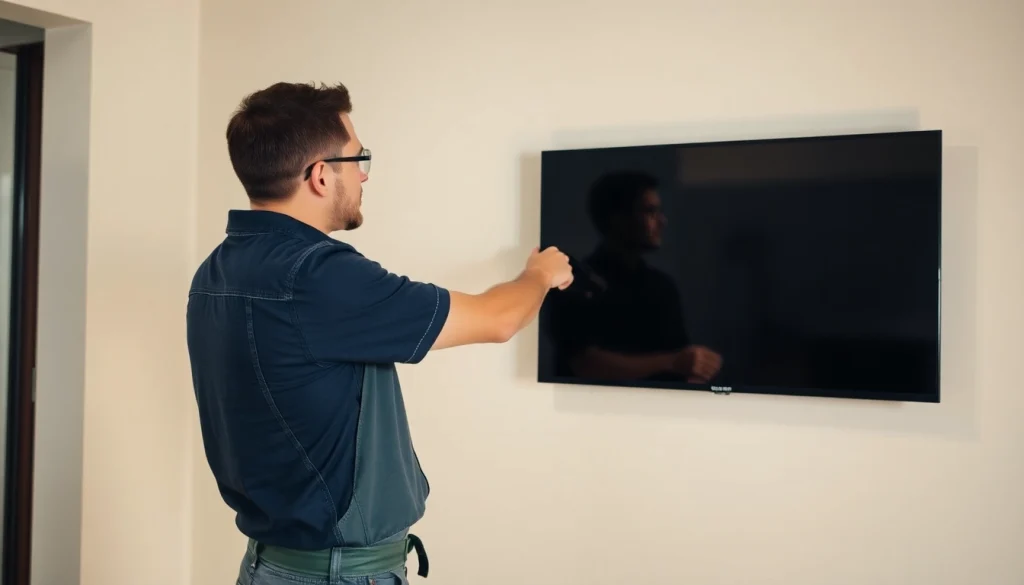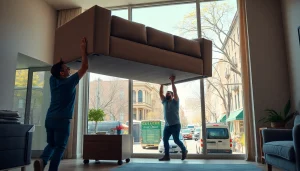Expert TV Mounting Installation Service for a Flawless Home Theater Setup

Understanding TV Mounting Installation Services
What is TV Mounting Installation Service?
TV mounting installation service refers to the professional service provided to securely mount televisions onto walls, ensuring they are safe, stable, and positioned optimally for viewing. A professional team typically conducts the service, which may include initial site assessment, selection of the appropriate mounting hardware, installation of the mount, and setup of any additional home theater equipment. These services are crucial for those who wish to optimize their home entertainment experience without the stress of doing it themselves. Investing in a TV mounting installation service helps ensure proper installation and reduces the risk of accidents or damage to your TV and home.
Benefits of Professional Installation
There are numerous advantages to opting for professional installation services for your TV. Here are some key benefits:
- Safety: Professionals understand the proper techniques to mount TVs securely, reducing the risk of damage to the device or injury to individuals nearby.
- Expertise: With training and experience, professional installers can handle complex installations that may involve heavy, large TVs or unique wall materials.
- Time-saving: Hiring professionals alleviates the stress and time commitment of a DIY installation, allowing homeowners to enjoy their entertainment systems sooner.
- Prevention of Damage: Incorrect installation can lead to drywall damage, equipment failure, or personal injury. Professionals take precautions to prevent these issues.
- Setup Assistance: Many installation services also include setting up and calibrating your TV, ensuring the best audio-visual experience.
Types of TV Mounts Available
Choosing the right type of TV mount is crucial and depends on your television model and aesthetic preferences. Below are the main types of mounts available:
- Fixed Mounts: These mounts hold the TV flush against the wall. They are straightforward to install but do not offer any adjustability. This type is perfect for viewers who always watch from the same position.
- Tilting Mounts: This option allows the TV to tilt downwards, providing a better viewing angle from lower seating positions. It’s suitable for rooms where the TV is mounted higher than eye level.
- Full-Motion Mounts: Also known as articulating mounts, these offer the most flexibility. They allow you to pull the TV away from the wall and tilt or swivel it for optimal viewing from various angles.
Choosing the Right TV Mount for Your Needs
How to Select a Suitable TV Mount
Selecting the right TV mount involves considering several factors including the size of your television, the weight, and the room’s layout. Experts recommend the following steps:
- Measure Your TV: Knowing the exact dimensions of your TV is essential. Most mounts will specify the size range they accommodate.
- Check the Weight: Each mount can support a specific weight limit. Ensure your chosen mount can securely hold your TV.
- Consider Viewing Angle: Evaluate where you will be seating in relation to the TV. Choose a mount that allows for adjustments to optimize viewing angles.
- Assess Wall Type: Different wall types (drywall, concrete, etc.) require different anchors and mounting methods. Make sure you select a mount compatible with your wall material.
Mounting Options: Fixed, Tilting, and Full-Motion
When considering which mount to select, evaluate the pros and cons of fixed, tilting, and full-motion options:
- Fixed Mounts: Perfect for minimalists but provide no swivel or tilting abilities. Best for watching from a single position.
- Tilting Mounts: An excellent choice for rooms with higher seating. They remain low profile yet provide some level of adjustability.
- Full-Motion Mounts: Ideal for dynamic living spaces where seating arrangements may change. They require more installation effort but are versatile.
Assessing Wall Types for Mount Installation
The wall type is a critical factor in determining the appropriate mounting method. Here’s how to assess your wall:
- Drywall: Commonly requires toggle bolts or specific anchors for secure mounting.
- Concrete or Brick: Requires masonry screws or anchors for secure attachment.
- Wood Studs: A perfect option for mounting, as they provide easy installation with standard screws.
Steps Involved in TV Mounting Installation
Preparing Your Space for Installation
Preparation is vital for a seamless TV mounting service. Here’s a checklist to ensure readiness:
- Identify the ideal wall space that allows for optimal viewing.
- Ensure the location is free of any obstructions (furniture, décor, etc.).
- Have necessary tools ready, such as a level, stud finder, and drill.
- Ensure nearby power outlets can accommodate your TV and connected devices.
Safety Precautions During Installation
Safety should always be a priority during installation. Here are essential safety precautions to observe:
- Use a stud finder to ensure the mount is secured to a stud instead of just drywall.
- Always have a second person assist when mounting a large TV.
- Check for electrical wires and plumbing before drilling into walls.
Post-Installation Setup and Calibration
Once mounted, proper setup ensures the best user experience. Follow these steps for effective calibration:
- Connect all devices (cable box, streaming devices, sound systems) and ensure they are powered on.
- Modify the TV settings for picture quality based on viewing preferences and room lighting.
- Consider using a professional calibration service for optimal audio and video settings.
Cost Considerations for TV Mounting Installation Services
Average Pricing and Factors Affecting Cost
The cost of TV mounting services can vary widely, influenced by several factors. On average, the cost falls between $100 and $300, depending on specifics such as:
- The size and weight of your TV.
- The complexity of the mount (fixed, tilting, full-motion).
- Your location and market rates for service professionals.
- Additional services like wiring, setup, and calibration.
Understanding Additional Fees and Services
Additional fees may apply depending on circumstances. For instance, if wall reinforcement is needed or if the installation requires longer travel times for the installer. It’s prudent to clarify any additional costs during the booking process:
- Extra charges for larger mounts or more advanced mounting methods.
- Wiring bundles or equipment setup services can incur extra fees.
DIY vs. Hiring Professionals: A Cost Analysis
While DIY mounting may seem cost-effective, hidden costs could outweigh savings. Here’s a breakdown of considerations:
- Initial Costs: DIY could be cheaper if you already have tools and the required mount; hiring a pro ensures you won’t have to purchase unnecessary equipment.
- Time Commitment: DIY takes longer as you may lack expertise and experience.
- Risk of Errors: Mistakes can lead to costly fixes. Professionals offer warranties that protect your investment.
Choosing the Right Service Provider
Evaluating Reviews and Ratings
Choosing the right service provider involves thorough research. Here are steps to evaluate potential installers:
- Check online reviews on platforms like Yelp and Google.
- Look for contractors with high ratings and positive customer testimonials.
- Ask for recommendations from friends or family who have had similar work done.
Questions to Ask Potential Installers
During consultations, ask essential questions to gauge the installer’s qualifications:
- What is your experience with TV mounting installations?
- Can you provide references or examples of previous work?
- Do you offer warranties for your installation service?
Importance of Warranty and Follow-Up Services
Understanding warranty options is crucial for peace of mind. Many professionals offer warranties that protect against installation mistakes or equipment damage. Follow-up services can include:
- Post-installation check-ups for a fixed duration.
- Adjustment services if the setup does not meet expectations.







